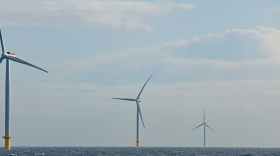The Delaware Department of Natural Resources and Environmental Control (DNREC) Division of Parks and Recreation held a public information event for proposed offshore wind transmission lines at 3Rs Beach on Tuesday.
In December, Gov. John Carney announced the start of formal negotiations between Delaware and US Wind regarding its two planned offshore wind projects.
While Maryland is heading the wind farms themselves, the lease at 3Rs Beach would allow for underground cables to deliver power from the turbines to the regional electrical grid.
DNREC Parks and Recreation Director Ray Bivens says the project will include four underground concrete cable vaults and any temporary disturbances would remain within limits of the parking area, adding there will be no disturbance of dunes, wetland habitats or the beach.
“Where these vaults are going is a sandy parking lot. If this project happens, when it’s all said and done, it’ll be the same kind of parking lot, serve all the same purposes. There would be eight manholes there that would occasionally be accessed," Bivens says.
He adds there is no set timeline as of now, but if the project is approved, it would require a one-time closure period for construction, limited to a single off-peak season between September 15 and May 15.
The beach would remain open during construction, but no pedestrian or beach vehicle access would be available from 3Rs until after May 15.
The proposed cables would be buried approximately 60 feet below the beach and dunes and approximately 40 feet below wetlands into the Indian River Bay. DNREC says only during construction would markers and buoys be visible to support construction and installation of cables on the Atlantic Ocean and bay sides.

The proposed lease of 3Rs Beach is $350,000 per year subject to an annual increase of 3%, and the agreement is expected to bring in more than $100 million in benefits to Delaware without raising utility rates, including funding for workforce development, dredging projects and for projects to mitigate the effects of climate change in state parks.
Protestors gathered outside the Bethany Beach Town Hall to oppose Delaware’s proposed involvement in the two offshore wind projects.
Director of the Center for Energy and Environmental Policy at the Caesar Rodney Institute David T. Stevenson is leading the opposition against the lease.
Although Delaware’s involvement with the projects would only be to provide an access point for the power to enter the grid, Stevenson hopes the projects will fall through entirely without the lease.
“We’re really trying to stop this offshore wind project, and right now, the only leverage Delaware has on this project to either change it, limit it, stop it – is this little piece of ground that they’re allowing the power to come ashore in," he says.
Stevenson cited concerns with the project’s effect on recreation and tourism, its potential to lower property values and any negative impacts on the environment, adding he would rather see more investments in solar power, nuclear power and carbon capture.
He also believes the project would violate Delaware’s Coastal Zone Act and says the American Coalition for Ocean Defense has been raising money in preparation for a lawsuit if the project moves forward.
Bivens says 3Rs beach is the sole proposed access point for the power cables at this time.
"This is the proposed route that is being put forward through the federal permitting. [US Wind] would have the option of moving somewhere else or something like that, but they've done studies to lead to this point, and we've looked at the place that would have the least impact, cultural resource reviews, natural resource reviews, those type of things," he says.
DNREC is currently accepting public comment through an online survey you can find here.




